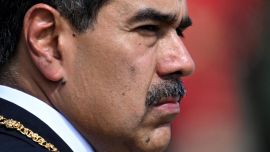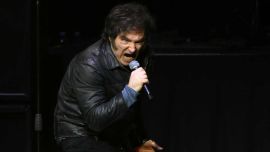Uruguayan presidential hopeful Daniel Martínez visited Buenos Aires last week, meeting with Alberto Fernández before presidential elections are held in both countries, this Sunday, October 27.
Polling at close to 40 percent, the Frente Amplio candidate said in an exclusive interview with Perfíl that he shares a friendship with the Peronist hopeful.
"If we both win, we’ll look to work alongside each other, taking similar routes in Uruguay and Argentina," said Martínez.
What issues did you discuss with Alberto Fernández?
He’s been at home drinking mate. We are planning on strengthening our technological and scientific capabilities, because both our countries are nothing alone. We also talked about the environment, the water quality of the Río de la Plata. The ideas is that we have a proposal, seek to align our policies, and find sustainable alternatives. We are proactively working to benefit our people.
Will you also be meeting with Mauricio Macri?
I don’t really have a relationship with Macri, but if he wins, even though it looks unlikely, I’d meet with him. If I am elected I will also be meeting with [Jair] Bolsonaro, even though I do feel that our values are more than entirely opposed. Macri did not have a positive time in office, which indicates that the Argentine people were not as prosperous, so I’m not really ecstatic. The people judge and decide.”
How is the Argentine economic crisis impacting Uruguay, and what are you doing to mitigate it?
The greatest impact is in tourism. We felt it last year and we’re worried about this year. We are developing a series of measures to reduce taxes and tolls. At some point Brazil and Argentina held 56 percent of external Uruguayan commerce. Today, both of them hold 22 percent together, with Argentina merely holding seven percent. Uruguay has sought to greatly diversify its international audience, and exports in multiple sectors have increased. Despite this having a lower economic impact, it does still affect us.
In the past, there were tensions between Néstor Kirchner and Tabaré Vásquez over the pulp mill and the president of Uruguay even asked the United States for military assistance. Do you fear that Uruguay could once again face tensions with Argentina?
We’re going to do everything possible to avoid conflicts. Today, the protocols are signed and agreed upon. But nothing was asked, it wasn’t like that – I deny it. At times things are misrepresented.
It’s like the ‘a la uruguaya’ escape of the crisis, which people said that Alberto wanted to repeat what happened at the Partido Colorado. Today he has clarified that he wants to is to address the refinancing of debt that Uruguay was able to accomplish. Uruguay was able to leave an economic crisis behind and replace it with growth and wealth redistribution, which is what the Frente Amplio did.
[Presidential rival Luis] Lacalle Pou could be endorsed by other candidates in an eventual second-round vote. Do you believe your share of the vote would suffer in a run-off vote?
We have to see if the coalition is shaping that way, because Manini Ríos has appeared, and Lacalle Pou wants to integrate him into his coalition. It already happened with [José 'Pepe'] Mujica and Tabaré Vásquez, who people said would lose if everyone voted against the Frente Amplio candidates. But people end up voting with their heads and their hearts, not by what other leaders tell them to. In a second-round vote, the vote is for people, not parties.
Uruguay kept themselves in the outskirts of the Lima Group and left TIAR (Inter-American Treaty of Reciprocal Assistance). Alberto Fernández said that, if he were to win, he’d take a similar position. What negotiation space is available to resolve the Venezuelan crisis?
“The basis of Uruguay’s position is promoting a solution that indicates respect for democracy and the complete compliance with human rights. Intervention for us is a bad word. It is an issue that needs to be resolved by the Venezuelan without any oversight and much less armed intervention that could generate a greater regional conflict.”
FACTFILE
-
Daniel Martínez is 62 years old and is an industrial mechanic engineer by trade.
-
He was formerly the mayor of Montevideo, president of the state-oil company Ancap and Minister of Energy and Industry.
-
He is part of the generational turnover within Frente Amplio, dominated by the leadership of Tabaré Vásquez, aged 79, José “Pepe” Mujica, aged 84, and Danilo Astori, aged 79.
-
He currently is leading the polls heading into the first round, but could be defeated in a second-round vote.
related news
by Celina Hernandez, for Perfil

























Comments